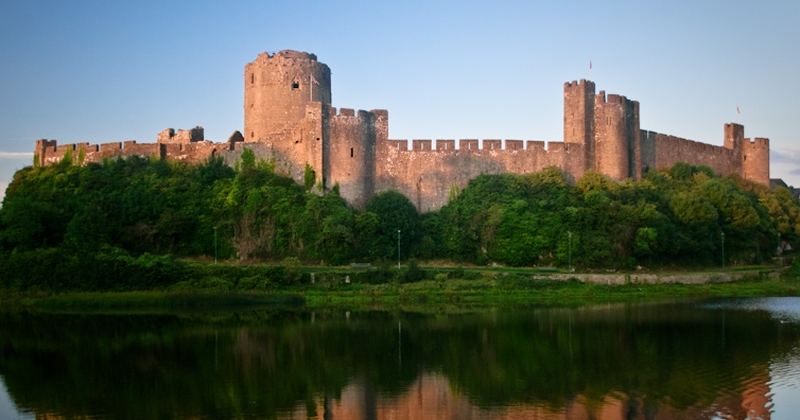Musings on History – Henry VII
King Henry VII – The Winter King
(by Lynne Thompson on 21st January 2022)

Pembroke Castle, birthplace of Henry VII
[ JKMMX ] [ CC BY-SA 3.0 ]
The Winter King
Since we are in the middle of winter, I’ve been thinking of a volume on my shelves on Henry VII, who could be called the Winter King. Indeed he was born in winter, on January 28th 1457, in Pembroke Castle, in Wales and that is one of the reasons why the Welsh dragon always formed part of his insignia.
Henry VII
The Winter King is also the title of a book by Thomas Penn, and a useful read. Henry VII was the founder of the Tudor dynasty and father of Henry VIII and I’ve been doing a bit of digging on this lesser known Tudor. One interesting thing about him is his early youth and the fourteen years he spent in exile in France – Brittany to be precise – and those, I believe, made him the man he was eventually to become. That is, suspicious, insecure and crafty but also determined, patient and fiercely proud of his Lancastrian ancestry.
His host was Francis, the Duke of Brittany, who saw Henry Tudor as a pawn in the game between Edward VI and the King of France. Edward would have liked to rid himself of Henry, a rival to his throne, but Francis kept Henry safe. That was to prevent the King of France capturing him and letting him loose on the English as a rival. Possession of something the French King wanted also made the Duke of Brittany safer in his own duchy. So Henry was a valuable bargaining tool, whose fate always depended on what relations were between England and France, always tainted by the recent Hundred Years War, and how Brittany sought to ward off threats to its own independence.
When Richard III became King, Henry’s strategy, planned by Margaret Beaufort, the mother whom he had not seen for years, was to declare in public, in Brittany’s Rennes Cathedral, that he would marry Edward IV’s daughter Elizabeth, then in sanctuary with her mother, and thus bury the enmity between Lancaster and York by making her his queen. Present were exiles from Richard’s court, friends of Edward IVth’s queen, but King Richard was able to bribe the ageing Duke of Brittany to relinquish Henry in return for funds to fight an increasingly hostile French king, whereupon Henry Tudor flew to the French court for sanctuary. There he found more English fugitives, willing to invade England in support of Henry, and bearing news that Richard III had serious plans to marry the princess Elizabeth himself. Thus, Henry Tudor had no choice but to gather together an army including mercenary soldiers as well as his own supporters, and he landed in Wales in August, 1485. The rest, as we say, is history; Richard III was defeated at the Battle of Bosworth and Henry Tudor had arrived out of nowhere and avenged the death of the little princes in the tower, although there is some debate as to who was actually responsible for their murder. At any rate, the Wars of the Roses had ended with a victory by which the winner took all, and regardless of his somewhat dubious Plantagenet ancestry.
As we know, Henry VII was true to his word, married Elizabeth and they founded the Tudor dynasty between them. If he trusted anyone, it would be his queen and why not, since both had so much in common – both being familiar with being in sanctuary, and pawns in the game of power? Both were survivors and as united in death as in life, as their tomb in Westminster Abbey illustrates.
You can find out more on the conflicts between England and France, the Wars of the Roses and also the Tudors in our history courses.
History courses taught by Lynne Thompson:
- (HIST003) Persecutions, Populations and Politics: Early Modern Britain 1550-1750
- (HIST004) Country, Colonies and Culture: Early Modern Britain 1550-1750
- (HIST006) The Stuart Court: History Politics and Culture
- (HIST010) The Tudors: History, Culture and Religion
- (HIST011) The English Country House: History, Architecture and Landscape
- (HIST014) The Victorian Countryside
- (HIST018) The Changing English Countryside
The Winter Queen
Next month find out more on someone known as The Winter Queen!